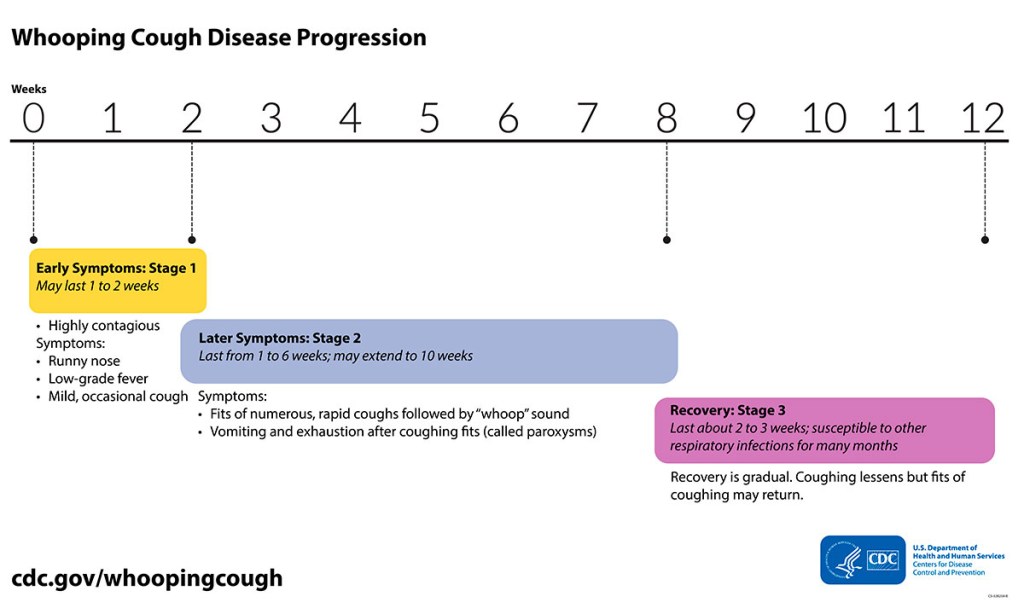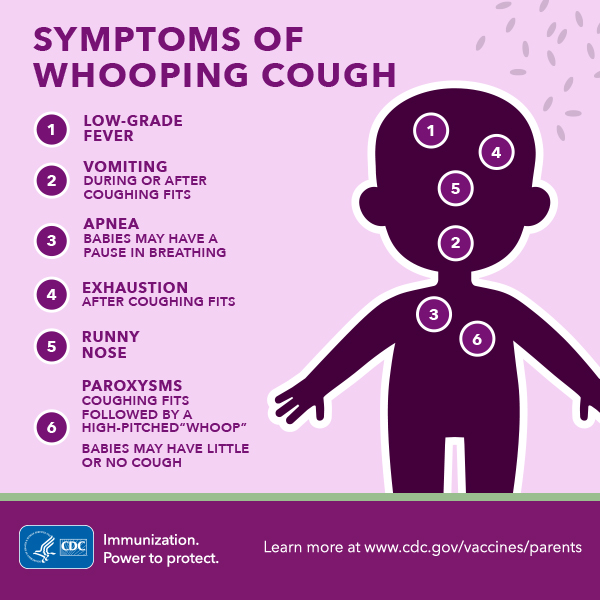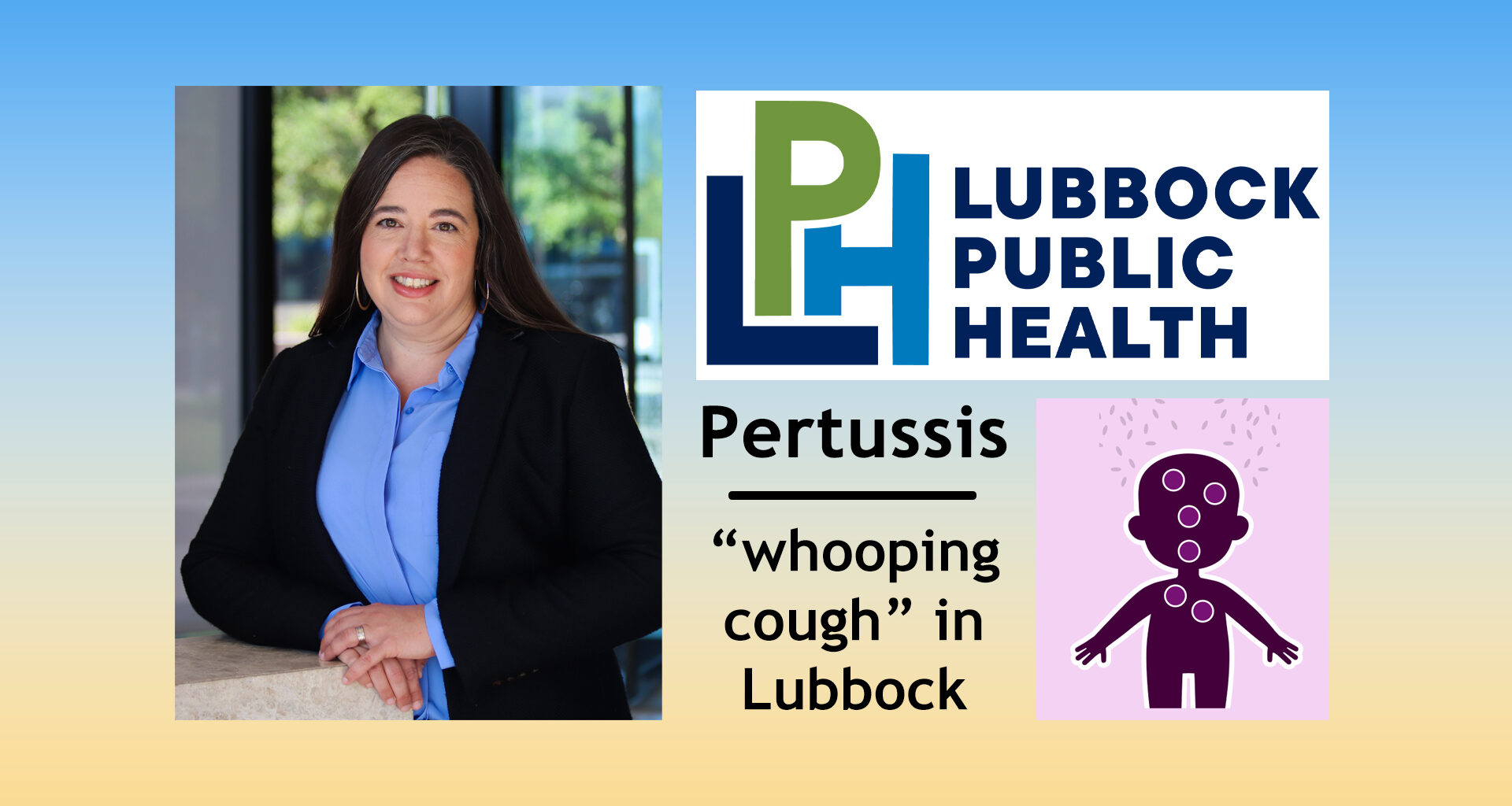Pertussis or whooping cough cases in Lubbock remain high according to Katherine Wells, public health director for Lubbock – part of a trend that hit its peak in 2024.
It is, she said, “a fairly miserable disease to get.”
“You’re coughing so much that you either vomit or can’t breathe,” Wells said.
 Credit: CDC website
Credit: CDC website
“Pertussis is the technical disease name and then ‘whooping cough’ is what people refer to it because of this characteristic whooping sound that happens after a coughing fit,” Wells said.
Sixteen percent of local cases from April to October resulted in hospitalization, according to numbers provided by the health department to LubbockLights.com. More than half of those cases were children between birth and 9 years old.
“Adults tend to do well. The real concern are our little ones. The younger the baby, the more severe the disease, the more likely of them being hospitalized,” Wells said.
The Centers for Disease Control said in a June press release, “While reported cases of whooping cough have been trending down since a peak in November 2024, cases remain elevated in 2025.”
According to the CDC’s Provisional Pertussis Surveillance Report, in 2023 there were roughly 2,950 reported U.S. cases. In 2024, it rose sharply to 18,780 reported cases.
Lubbock has been consistent with the national trend, Wells said.
“Pertussis activity began increasing in November 2024, with the highest reported cases in December 2024,” Wells said of the local cases.
There were 13 cases in December. And her department asks local doctors to keep an eye out, she said.
“Numbers have remained consistent but elevated. We urge providers to consider testing for pertussis as we move into peak respiratory season,” Wells said.
Pertussis in Lubbock
Total cases:
2025
|
41 (through Sept.)
The city’s health department said 60 percent of recent cases were people with a history of at least one dose of pertussis vaccine. The other 40 percent were either unvaccinated or unknown status. The pertussis vaccine wears off over time.
“Because it also contains the tetanus vaccine, we recommend everybody get that vaccine at least every 10 years,” Wells said.
Women are advised to get one with every pregnancy along with family members who will be in contact with a newborn baby.
The Pan American Health Organization reported in late March, the U.S. suffered five pertussis deaths so far in 2025. LubbockLights.com was unable to find more recent numbers for pertussis fatalities.
News media articles indicated deaths this year in Louisiana, Idaho and Washington State.
Locally, there has not been a death in recent years.
“Not while I’ve been in the health department. So, at least 10 years,” Wells said.
“Because this is a bacteria, we can prescribe medication. So, if a family member has pertussis, we can give the family preventative treatment or the physician can give preventative treatment to keep it from spreading in a household,” Wells said.
Vaccines
The flu shot is not the same as a pertussis vaccine. One reduces the risk from a virus – the other a bacteria.
“Overall, I think we’re seeing decreases in the willingness of individuals to get vaccinated. During the measles outbreak, we saw an increase because people were seeing measles cases, but they came and only got the vaccine for measles. I think we’re seeing all vaccination rates, really starting to decrease in Lubbock and also in the United States,” Wells said.

Illustration of Pertussis or whooping cough from CDC Facebook page
“It’s multifaceted. I wish there was like one simple solution for it,” Wells said.
People don’t trust government. But people also don’t trust pharmaceutical companies, Wells said.
“There’s information out there that your doctors and pharmaceutical companies are making lots of money off of vaccines,” Wells said.
But that’s usually not the case, Wells said.
“Vaccine is actually something you tend to lose money on,” Wells said.
“We have a lot of focus on parental rights. And I think when we have vaccine mandates, even though there’s science behind it, I think people see that as a mandate. And they don’t want to follow it,” Wells said.
Vaccines make some dreaded diseases rare. But once they become rare, people wonder why they need the vaccine for something that rarely see, she said.
Related
Related posts



